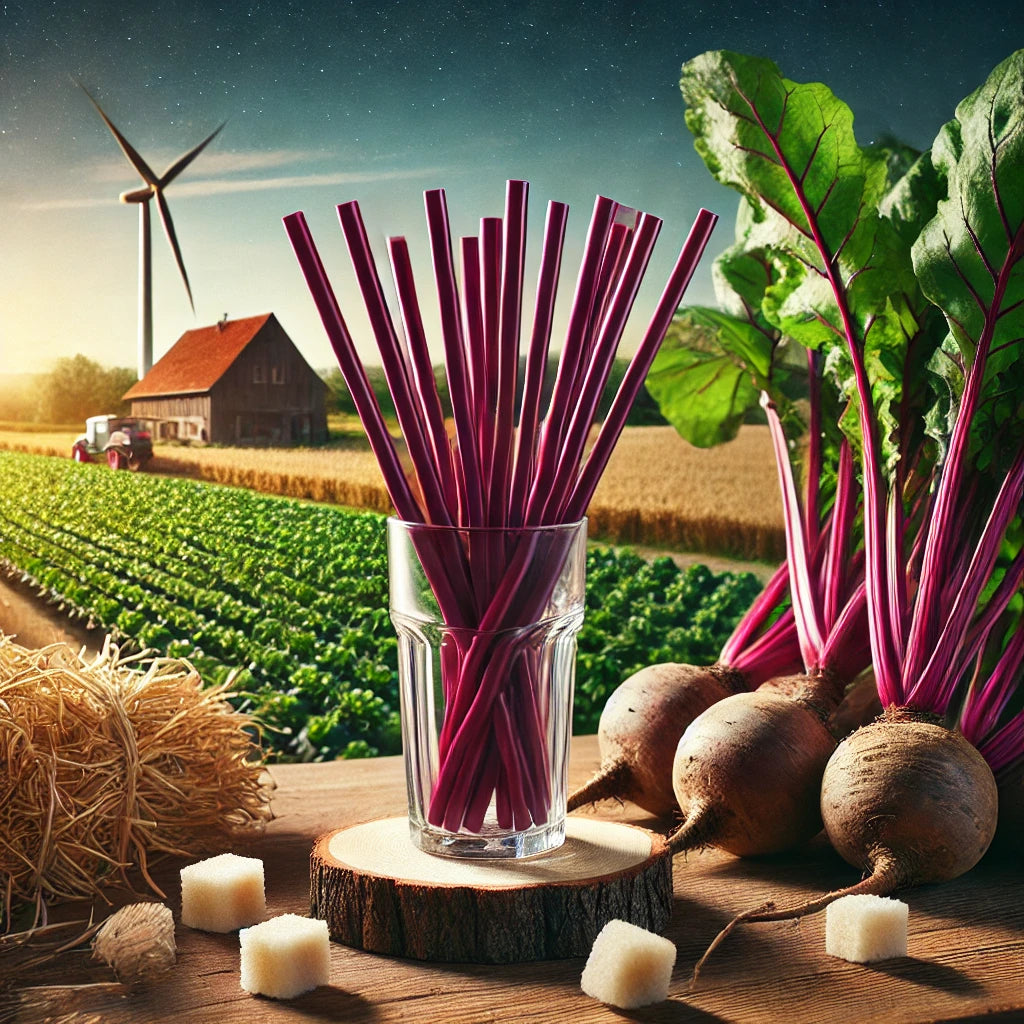
How sugar beet fiber straws support French agriculture
Introduction
Why do beet fiber straws support French agriculture? This question is central to the shift toward more sustainable and environmentally friendly practices. Indeed, beet fiber straws are not only an eco-friendly alternative to single-use plastics, but they also play a vital role in supporting French agriculture. In this article, we will explore the many ways these straws help strengthen the local economy, reduce agricultural waste, and promote sustainable agriculture in France.
What are Beet Fiber Straws?
Beet fiber straws are made from bagasse, a byproduct of sugar beet extraction used to make sugar. Rather than discarding this raw material, it is transformed into sturdy, biodegradable, and compostable straws. This manufacturing process is not only environmentally friendly, but also rooted in a circular economy approach, where nothing is lost, but everything is transformed.
In France, sugar beet is a major agricultural crop. Regions such as Nord-Pas-de-Calais, Picardy, and Champagne-Ardenne are particularly known for their vast beet fields. By transforming the residues of these crops into straw, French farmers are finding a new source of income while actively reducing agricultural waste.
Positive Impact on French Agriculture
Straws-berry straws provide valuable support to French agriculture in several ways. First, they help strengthen the local economy. By purchasing beet fiber straws, consumers and restaurateurs directly support French farmers, creating demand for local products and ensuring the sustainability of this industry.
Second, these straws help reduce agricultural waste. Sugar beet is an intensive crop that leaves behind a significant amount of residue after sugar extraction. Traditionally, this residue was often underutilized or even considered waste. Today, thanks to innovation, these by-products are transformed into straw, creating added value for farmers and contributing to a circular economy.
Finally, beet cultivation contributes to biodiversity in France. Beet fields play a crucial role in crop rotation, enriching the soil and contributing to the health of local ecosystems. By supporting beet fiber straws, consumers are indirectly participating in the preservation of this biodiversity.
Ecological Benefits
The ecological benefits of beet fiber straws are numerous. By replacing plastic straws, they significantly contribute to reducing the carbon footprint. Plastic production is extremely energy-intensive and uses fossil resources, not to mention the waste it generates. Beet fiber straws, on the other hand, are made from renewable resources and are significantly less energy-intensive to produce.
Additionally, these straws are biodegradable and compostable. Unlike plastic straws, which can take centuries to decompose, beet fiber straws degrade in just a few months. This means they don't contribute to microplastic pollution in soils and oceans, a growing global concern.
Furthermore, the production of beet fiber straw has a positive impact on soil and water. Beet fields are often irrigated responsibly, and the processing of by-products does not require the use of harmful chemicals. This results in a smaller environmental footprint, both during production and at the end of the product's life.
How French Restaurants and Cafes Are Adopting Beet Fiber Straws
Many restaurants and cafes in France have already adopted beet fiber straws as an eco-friendly alternative to plastic straws. These establishments are often motivated by a desire to reduce their environmental impact while meeting growing consumer expectations for more sustainable products.
For example, an eco-friendly restaurant in Paris not only significantly reduced its plastic waste but also saw an increase in customer satisfaction after introducing these straws. Customers appreciate the establishment's effort to provide a more eco-friendly experience, and this is reflected in the positive feedback they leave on social media.
Similarly, a café in Lyon found that adopting beet fiber straws not only reduced waste but also served as a positive talking point among customers. This initiative reinforced the establishment's reputation as a leader in the field of sustainability.
Encouraging an Ecological Transition in France
The adoption of beet fiber straws by restaurants, cafes, and other foodservice establishments in France is a great example of how businesses can contribute to an ecological transition. However, for this transition to be truly effective, it is essential that support policies and tax incentives are put in place to encourage this widespread adoption.
Local and national governments can play a crucial role by offering grants or tax incentives to establishments that adopt eco-friendly practices such as using beet fiber straws. These measures not only reduce costs for businesses, but also strengthen society's commitment to environmental protection.
Additionally, consumer awareness is essential. Establishments must not only adopt sustainable practices, but also effectively communicate these initiatives. Customers must understand the importance of choosing eco-friendly products, and this requires ongoing education and awareness campaigns.
Conclusion
Beet fiber straws represent much more than just an alternative to plastic straws. They reflect a deep commitment to French agriculture, waste reduction, and the promotion of sustainable practices. By supporting these straws, we also support French farmers, contribute to the circular economy, and play an active role in preserving our environment.
For consumers, restaurateurs, and policymakers, adopting beet fiber straws is a choice that combines respect for the environment, support for the local economy, and meeting consumer expectations for sustainability. By taking this step, we are all contributing to a greener and more responsible future for France.
FAQ
What is beet fiber and how is it used in straws?
Beet fiber is a by-product of sugar beet extraction, used after juice extraction for sugar. It is processed into biodegradable and compostable straws, offering an environmentally friendly alternative to plastic straws.
Are beet fiber straws really biodegradable?
Yes, beet fiber straws are completely biodegradable and will decompose naturally within months, unlike plastic straws which can take centuries to decompose.
How do beet fiber straws support French agriculture?
Beet fiber straws support French agriculture by enhancing beet by-products, creating new sources of income for farmers and strengthening the local circular economy.
Where can I buy beet fiber straws in France?
Beet fiber straws can be purchased from many eco-friendly suppliers in France, such as Straws-berry .
